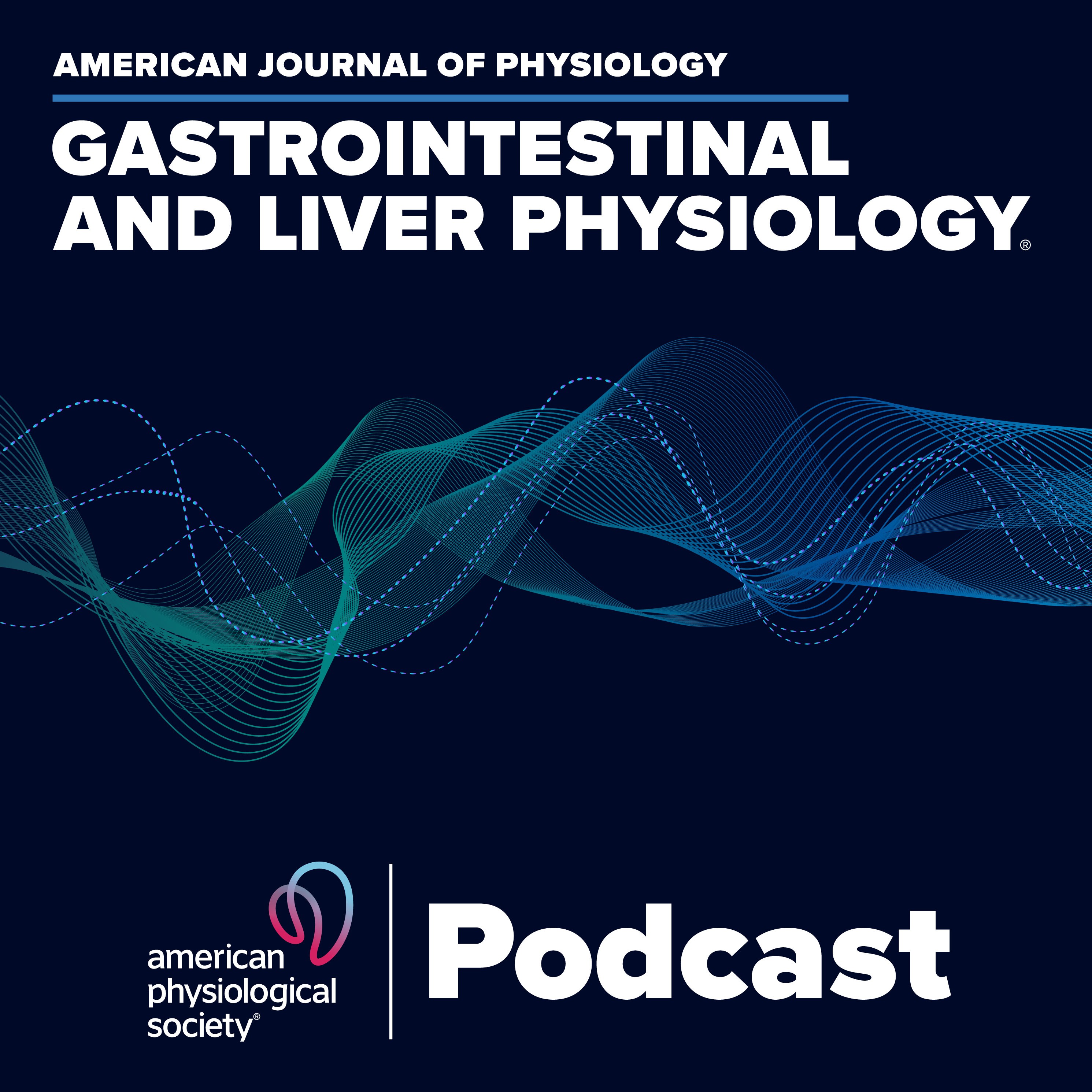
Episodes
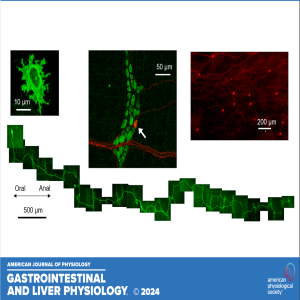
Monday May 13, 2024
Monday May 13, 2024
In this episode, Jia Liu and Bin Feng highlight the recently published research titled "Morphological, molecular, and functional characterization of mouse glutamatergic myenteric neurons." In this research, the authors reveal that VGLUT2-positive enteric neurons (EN), although constituting a small fraction of total EN, are homogeneously expressed in the myenteric ganglia, with a slight concentration at the intermediate region between the colon and rectum. Through anatomic, molecular, and functional analyses, we demonstrated that VGLUT2-ENs are activated indirectly by noxious circumferential colorectal stretch via nicotinic cholinergic transmission, suggesting their participation in mechanical visceral nociception.
Article Citation:
American Journal of Physiology-Gastrointestinal and Liver Physiology 2024 326:3, G279-G290
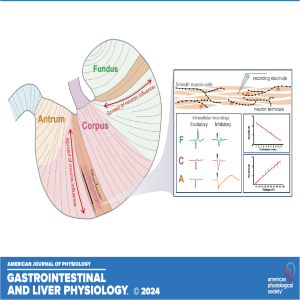
Monday Mar 04, 2024
”Got Guts” The Micro Version: Gastric Neuromuscular Transmission
Monday Mar 04, 2024
Monday Mar 04, 2024
In this episode of the Got Guts podcast series Madeleine R. Di Natale of the University of Melbourne discusses the recently published manuscript titled "Characterization of neuromuscular transmission and projections of muscle motor neurons in the rat stomach." This study provides a detailed mapping of nerve transmission to the circular muscle of the different anatomical regions of rat stomach. It shows that excitatory and inhibitory influences extend around the gastric circumference and that there is a summation of neural influence that allows for finely graded control of muscle tension and length. Nerve-mediated electrical events are qualitatively and quantitatively different between regions, for example, excitatory neurons have direct effects on fundus but not antral muscle.
Article Citation:
American Journal of Physiology-Gastrointestinal and Liver Physiology 2024 326:1, G78-G93
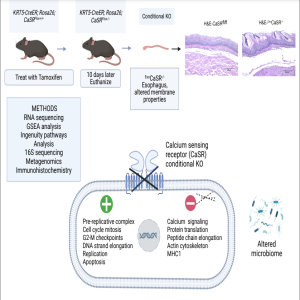
Friday Feb 23, 2024
Friday Feb 23, 2024
In this episode of the Got Guts Podcast series, Solange M. Abdulnour-Nakhoul of Tulane University, discusses the recently published manuscript titled "Alterations in gene expression and microbiome composition upon calcium sensing receptor deletion in the mouse esophagus." In this research Abdulnour-Nakhoul et al. highlight why calcium sensing receptor plays a significant role in maintaining the barrier function of esophageal epithelium.
Article Citation:
American Journal of Physiology-Gastrointestinal and Liver Physiology 0 0:0
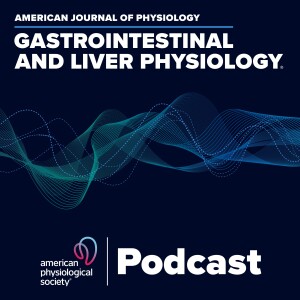
Friday Feb 16, 2024
Friday Feb 16, 2024
Listen as Editor in Chief of AJPGI and Liver Physiology, Mark Frey and the Chair of the Gastrointestinal & Liver Section, Pradeep Dudeja discuss what they are looking forward at the 2024 American Physiology Summit, April 4-7th.
Registration Deadline for American Physiology Summit is March 11, 2024.
Click here for more info on the American Journal of Physiology Gastrointestinal and Liver Physiology
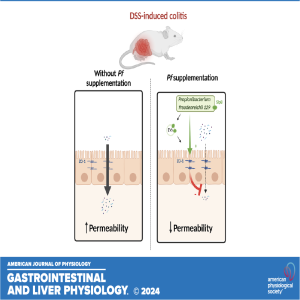
Thursday Feb 08, 2024
”Got Guts” The Micro Version: Pf Inhibits Inflammation-Induced Epithelial Break-Down
Thursday Feb 08, 2024
Thursday Feb 08, 2024
In this episode Marine Mantel of Nantes Université discusses the recently published research in AJP-GI and Liver Physiology titled "Propionibacterium freudenreichii CIRM-BIA 129 mitigates colitis through S layer protein B-dependent epithelial strengthening."
NEW & NOTEWORTHY Propionibacterium freudenreichii reduces dextran sodium sulfate (DSS)-induced intestinal permeability in vivo. P. freudenreichii does not inhibit inflammation but damages linked to inflammation. P. freudenreichii inhibits intestinal epithelial breakdown through S-layer protein B. The protective effects of P. freudenreichii depend on S-layer protein B. Extracellular vesicles from P. freudenreichii CB 129 mimic the protective effect of the probiotic.
Article Citation:
Marine Mantel, Tony Durand, Anne Bessard, Ségolène Pernet, Julie Beaudeau, Juliana Guimaraes-Laguna, Marie-Bernadette Maillard, Eric Guédon, Michel Neunlist, Yves Le Loir, Gwénaël Jan, and Malvyne Rolli-Derkinderen
American Journal of Physiology-Gastrointestinal and Liver Physiology 2024 326:2, G163-G175
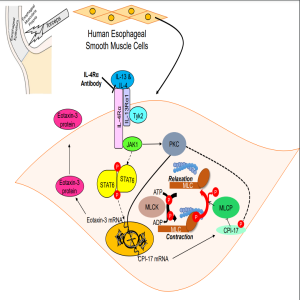
Monday Dec 18, 2023
”Got Guts” The Micro Version: IL-4Rα Signaling in Esophageal Smooth Muscle
Monday Dec 18, 2023
Monday Dec 18, 2023
In this episode author, Melissa Nelson of Baylor University Medical Center, discusses the recently published manuscript titled "Th2 Cytokine Signaling through IL-4Rα Increases Eotaxin-3 Secretion and Tension in Human Esophageal Smooth Muscle."
New and Noteworthy:
Nelson et al. have found that Th2 cytokines increase eotaxin-3 secretion and tension in esophageal smooth muscle (ESM) cells via IL-4Rα signaling. Unlike esophageal epithelial cells, ESM cells do not express H+,K+ATPase, and omeprazole does not inhibit their cytokine-stimulated eotaxin-3 secretion or tension. An IL-4Rα blocking antibody reduces both eotaxin-3 secretion and tension induced by Th2 cytokines in ESM cells, suggesting that an agent such as dupilumab might be preferred for EoE patients with esophageal muscle involvement.
Article Citation:
American Journal of Physiology-Gastrointestinal and Liver Physiology 0 0:0
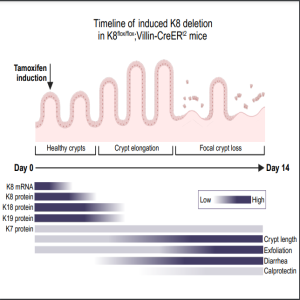
Wednesday Dec 13, 2023
”Got Guts” The Micro Version: Order of Events after Keratin 8 Sequential Downregulation
Wednesday Dec 13, 2023
Wednesday Dec 13, 2023
In this podcast, authors Maria A. Ilomäki and Lauri Polari (both at Åbo Akademi University) discuss their recently published research titled “Defining a timeline of colon pathologies after keratin 8 loss: Rapid crypt elongation and diarrhea are followed by epithelial erosion and cell exfoliation.”
New and Noteworthy:
Understanding the order in which physiological and molecular events occur helps to recognize the onset of diseases and improve their preclinical models. We utilized Cre-Lox-based inducible keratin 8 deletion in mouse intestinal epithelium to characterize the earliest events after keratin 8 loss leading to colitis. These include diarrhea and crypt elongation, followed by erosion and neutrophil activity. The authors results also support noninvasive methodology for monitoring colon diseases in preclinical models.
Article Citation:
American Journal of Physiology-Gastrointestinal and Liver Physiology 0 0:0
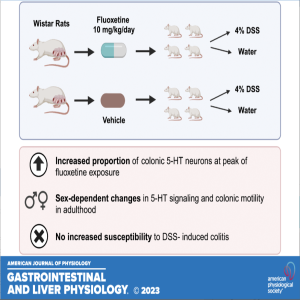
Friday Dec 01, 2023
Friday Dec 01, 2023
In this episode authors Katherine L. Prowse,, and Elyanne M. Ratcliffe of McMaster University, discuss their recently published article titled “Effects of in utero exposure to fluoxetine on the gastrointestinal tract of rat offspring.”
NEW & NOTEWORTHY There is increasing recognition of the relevance of in utero and early postnatal exposures in the developmental programming of the gastrointestinal tract. Perinatal exposure to selective serotonin reuptake inhibitors and antidepressant medications is of particular relevance as they are commonly prescribed during pregnancy, and serotonergic pathways play key roles during gastrointestinal development and in postnatal homeostasis. Here, we provide a comprehensive evaluation of clinically relevant outcomes of gastrointestinal motility and susceptibility to colitis in fluoxetine-exposed offspring and highlight changes in colonic serotonergic neurons at the peak of perinatal fluoxetine exposure with sex-dependent changes in serotonin signaling and colonic motility in adulthood.
Article Citation:
Effects of in utero exposure to fluoxetine on the gastrointestinal tract of rat offspring
Katherine L. Prowse, Harriet Law, Sergio Raez-Villanueva, Filip Markovic, Megan Wang, Rajka Borojevic, Sean P. Parsons, Alexander D. Vincent, Alison C. Holloway, and Elyanne M. Ratcliffe
American Journal of Physiology-Gastrointestinal and Liver Physiology
2023 325:6, G528-G538
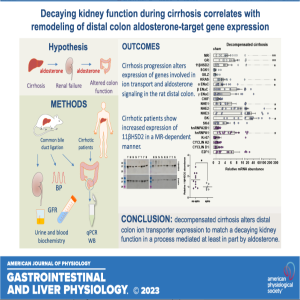
Friday Nov 17, 2023
Friday Nov 17, 2023
Diego Alvarez de la Rosa of the University of La Laguna discusses the recently published manuscript titled “Decaying kidney function during cirrhosis correlates with remodeling of distal colon aldosterone target gene expression.”
NEW & NOTEWORTHY Liver cirrhosis progression significantly alters ion transporter subunit expression in the rat distal colon, a change that correlated well with declining kidney function and the severity of the disease. Natalia Serrano-Morillas et al. data suggests that the steroid hormone aldosterone participates in this homeostatic response to maintain electrolyte balance.
Article Citation:
Natalia Serrano-Morillas, Carlos González-Alayón, Arianna Vastola-Mascolo, Ana E. Rodríguez-Rodríguez, Guadalberto Hernández, Esteban Porrini, Manuel Hernández-Guerra, and Diego Alvarez de la Rosa
American Journal of Physiology-Gastrointestinal and Liver Physiology 2023 325:4, G306-G317
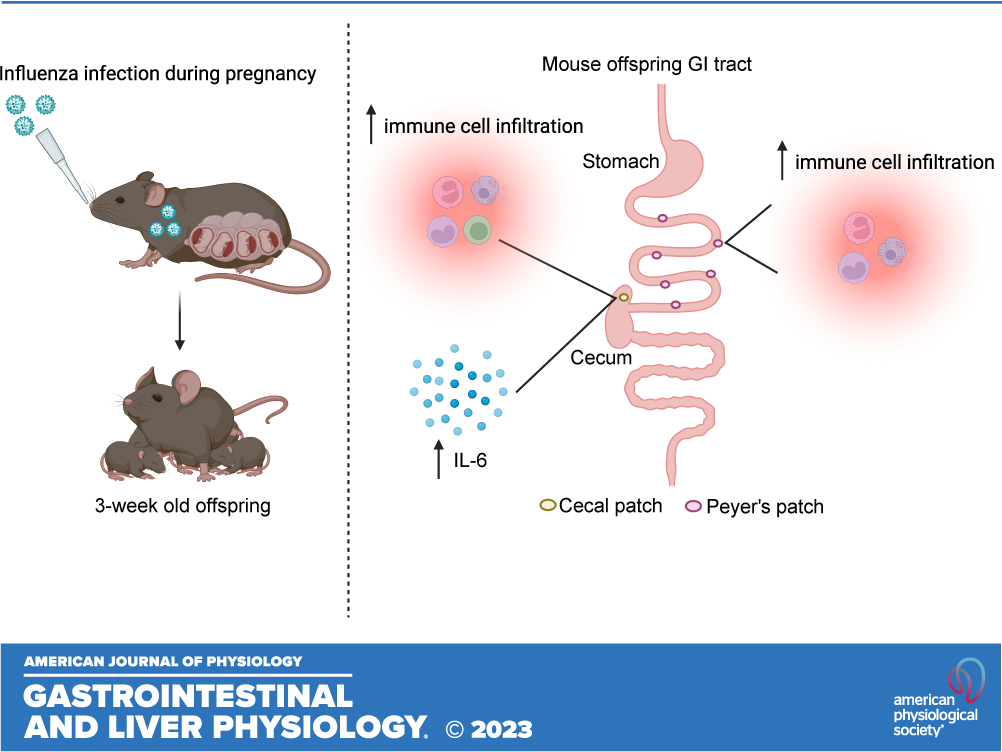
Tuesday Oct 17, 2023
Tuesday Oct 17, 2023
In this podcast lead author Dr. Stella Liong of RMIT University, discusses the recently published manuscript titled “Influenza A virus infection during pregnancy causes immunological changes in gut-associated lymphoid tissues of offspring mice.”
NEW & NOTEWORTHY Influenza A virus (IAV) infection during pregnancy is associated with changes in gut-associated lymphoid tissue (GALT) in the offspring in a region-dependent manner. Neutrophils and monocytes/macrophages were elevated in the cecal patch of offspring from infected dams. This increase in innate immune cell infiltration was not observed in the Peyer’s patches. T cells were also elevated in the cecal patch but not in the Peyer’s patches.
Article Citation:
Stella Liong, Mark A. Miles, Mitra Mohsenipour, Felicia Liong, Elisa L. Hill-Yardin, and Stavros Selemidis
American Journal of Physiology-Gastrointestinal and Liver Physiology 2023 325:3, G230-G238
